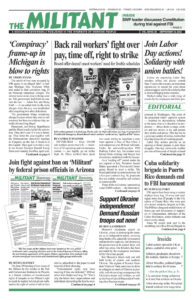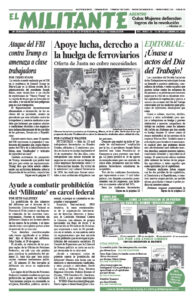FBI agents have been using a variety of ploys since Aug. 23 to try and interrogate more than 35 people in the U.S. colony of Puerto Rico who were part of a recent solidarity brigade to Cuba. The FBI has a long and sordid history of frame-ups and harassment of supporters of independence, defenders of the Cuban Revolution, union militants and others on the island.
Some 90 people took part in the monthlong Juan Rius Rivera Brigade to Cuba this July, including students and other youth, trade unionists, professionals and retired workers. It was the 31st annual brigade from Puerto Rico — after a two-year hiatus because of the COVID-19 pandemic.
“We go every year,” Milagros Rivera, president of the Committee in Solidarity with Cuba, which organizes the brigade, told the Militant by phone from San Juan Aug. 26. “Everything we do is public.”
Rivera received a phone call from Darío Ortiz, after two FBI agents knocked on his door at 8 a.m. Aug. 23. He refused to talk to them.
“It’s now 35 or 40 people,” Rivera said. Some were visited at home, the FBI called others by phone. Some were asked if they know Rivera. Others were told that “Cuban security agents” infiltrated in the brigade. When the agents told one of the activists that the FBI was investigating a “violation” of the law, the person asked, “What law?”
“We can’t tell you over the phone,” the political-police agent said. “But if you meet us for coffee we’ll tell you more.”
This year’s brigade met with a number of Cuban mass organizations to learn more about the socialist revolution there and to discuss the fight against the colonial status of Puerto Rico. They joined Cubans in voluntary work and brought medical supplies to help overcome shortages caused by Washington’s economic war on Cuba.
Like numerous brigades from the U.S. and worldwide, participants from Puerto Rico were hosted by the Cuban Institute for Friendship with the Peoples.
“The Cuban Revolution is a hope for the entire world, especially for Puerto Rico where the situation is very bad,” Rivera told the press in Cuba. “For 124 years we have been under the boot of U.S. imperialism.” Cuba shows it is possible to win real independence.
“We let everyone on the brigade know that they shouldn’t talk to the FBI. Period,” she said. “Tell them to talk to your lawyer or get the agent’s name and tell them you’ll give it to your lawyer.” And when the FBI puts on airs of “super cordiality,” don’t let them fool you.
“The FBI is an instrument to perpetuate colonialism in our country,” Rivera said. “They are trying to intimidate and frighten us and to criminalize our solidarity with Cuba.”
This attack comes as protests are taking place in Puerto Rico over worsening power outages, she said, since U.S-Canadian owned Luma was given a lucrative contract by the government to run the island’s electrical grid. The U.S. rulers fear any move that strengthens the fight against U.S. colonial rule.
“We can’t be quiet in the face of this harassment,” Rivera said. “We have to let people know what is happening.”
FBI’s history in Puerto Rico
In the 1930s the FBI was used to help frame up and jail Nationalist leader Pedro Albizu Campos.
In the 1960s the U.S. government launched Cointelpro — Counter Intelligence Programs — that targeted the political activities of millions of people. These FBI disruption operations targeted Black rights organizations, the anti-Vietnam War movement, Communist Party, Socialist Workers Party, women’s rights groups and others. Its operations in Puerto Rico and against Puerto Rican independentistas in the U.S. were among the largest FBI Cointelpro campaigns, launching at least 37 disruption programs. This included participation in the entrapment operation and police execution of two young independentistas at Cerro Maravilla in 1978.
The FBI still refuses to release all its records on the 1979 assassination in San Juan of Carlos Muñiz Varela, who was part of a group of young Cubans in Puerto Rico and the U.S. who promoted normalizing relations with Cuba. What has been released revealed that the FBI had informants in the rightist group that planned the killing.
In 2000, in the midst of sustained protests against the U.S. military occupation of the island of Vieques and a campaign to release pro-independence political prisoners, then-FBI Director Louis Freeh was pressured to release thousands of previously classified documents.
Freeh admitted the documents showed the FBI violated the constitutional rights of Puerto Ricans and engaged in “egregious illegal action, maybe criminal action.” Freeh and the Bill Clinton administration tried to claim FBI operations like this were a thing of the past, that there was a “new,” “clean” FBI. But that was a lie.
In 2004 the FBI and IRS agents raided the headquarters of the water workers union during of a strike by 4,300 workers. In 2005 the FBI raided a farmhouse in Hormigueros, where they shot Filiberto Ojeda Ríos, a longtime figure in the struggle for Puerto Rico’s independence. They waited a day before entering the premises. He was dead.
The Committee in Solidarity with Cuba is calling on defenders of democratic and political rights from around the world to demand the FBI cease its latest round of harassment. Send messages protesting FBI harassment in Puerto Rico to cscpr2020@gmail.com, attention Milagros Rivera.
Speak out against FBI harassment
Edgardo Román Espada, a spokesperson for the Committee for Human Rights of Puerto Rico, said the FBI visits “are measures of intimidation that seek to stop the historic solidarity between the people of Puerto Rico and Cuba.”
Cuban President Miguel Díaz-Canel said, “We denounce the harassment of our brothers and sisters of Puerto Rico, members of the Juan Rius Rivera Solidarity Brigade with Cuba who just visited us. History has united us for 150 years. There is no force capable of dividing us.”
The latest FBI harassment of the Cuba solidarity brigade participants in Puerto Rico is not an isolated incident. It’s part of a series of attacks on constitutional protections against government interference, including the armed FBI raid on the Florida home of former President Donald Trump in Mar-a-Lago; the raid on the offices of the African People’s Socialist Party in St. Petersburg, Florida, and St. Louis. And U.S. Sen. Marco Rubio from Florida calling on the FBI to investigate Bridges of Love — which organizes monthly protests against the U.S. government’s economic war against Cuba — for prosecution as “foreign agents.”

